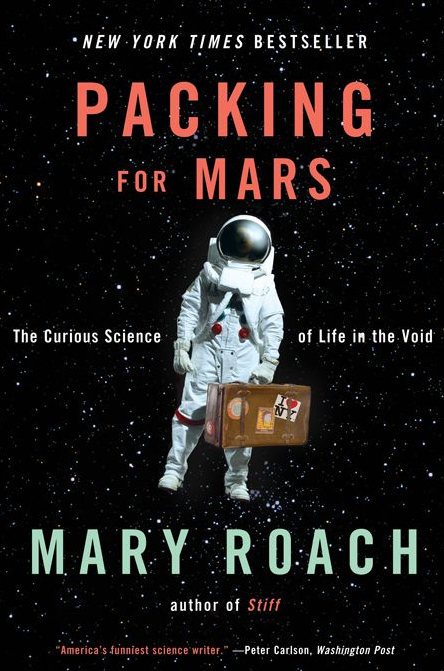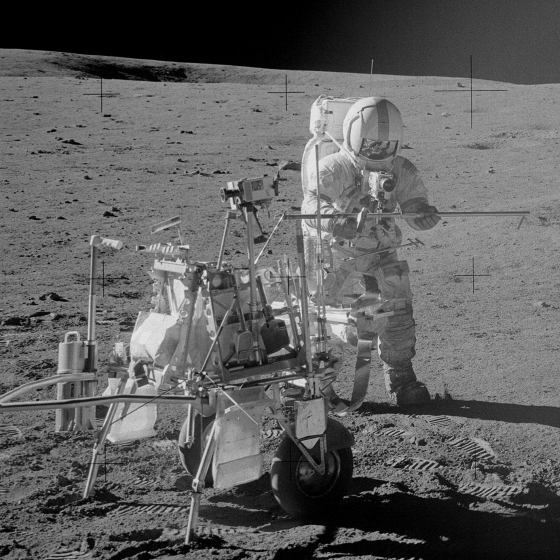 LAST APRIL, WHILE I WAS IN MINNESOTA WITH MY SISTER, my colleague Roger Smith filmed author Mary Roach in conversation with Michael Krasny at Dominican University of California. I just spent last week reading Mary’s book, “Packing for Mars,” which was the focus of the One Book One Marin program for 2013.
LAST APRIL, WHILE I WAS IN MINNESOTA WITH MY SISTER, my colleague Roger Smith filmed author Mary Roach in conversation with Michael Krasny at Dominican University of California. I just spent last week reading Mary’s book, “Packing for Mars,” which was the focus of the One Book One Marin program for 2013.
I love the idea of “One Book.” As the One Book One Marin website states, “One Book programs take the idea of a localized book discussion club and expand it to cover a whole city or county.
“Each year, cities across the U.S. select a book of their choice and encourage their communities to read and discuss that book. The goal of One Book One Marin is to build a stronger, enriched community through library utilization, community dialogue, and the exploration of literature and culture.”
This year, Marin is focusing on Novella Carpenter’s book, “Farm City.” It should be very interesting and hopefully I’ll provide you with a full report on Novella and her book in early May after the wrap up of the program. However, it’s Roach’s “Packing for Mars” that I want to reflect on. Mary is a writer specializing in science topics, and in her book she explored what it will take to send a human mission to Mars. Her exploration took her back to the early days of high-altitude and space flight. As a young girl, I had a deep interest in the entire early space programs. I followed all the launches and thrilled to the accomplishments of Alan Shepard and John Glenn, along with the Mercury, Gemini and Apollo missions. As a young second lieutenant stationed at Hamilton Air Force Base in Novato, I had the chance to meet several astronauts and years later I had the pleasure of having dinner with Rusty Schwieckart as part of a scenario planning training course I took.
 Space has always been instructive as an environment posing innumerable challenges for staying alive. R. Buckminster Fuller felt going to space was essential to learn how to value and conserve our resources on Earth. I take the title of my Forum articles from his statement that we are all crewmembers on a beautiful spaceship called Earth.
Space has always been instructive as an environment posing innumerable challenges for staying alive. R. Buckminster Fuller felt going to space was essential to learn how to value and conserve our resources on Earth. I take the title of my Forum articles from his statement that we are all crewmembers on a beautiful spaceship called Earth.
Fuller devoted his life working on the problems of how to make planet Earth “work for everyone.” Roach researched the history and challenges that dealt with the big issues of space exploration: weightlessness, the “perilous psychology of isolation,” food and digestion, elimination (from both ends), spacesuits, surviving bailouts, extreme G-forces and more. She plowed through volumes of scientific papers on all manner of topics of surviving in space and interviewed many of the men and women engaged in human space exploration.
With our rapidly evolving climate realities right here on Earth, I can’t but help thinking that Fuller was correct in his view that many of the things we have been learning about survival in space will become essential for our survival here. It’s good to know that we have a repository of knowledge that can be used to both mitigate and to survive new conditions on Earth.
I recommend Roach’s book. It will bring things to light you may never have taken the time to consider. I’ll include a link to her One Book One Marin 2013 conversation with Michael Krasny below.
Speaking of mitigation
Please mark your calendars for Monday, March 3. The Community Sustainability Commission is sponsoring a public education panel with Shawn Marshall, executive director of LEAN Energy US, and Jamie Tuckey, communications director for Marin Clean Energy. The panelists will speak at the Community Center, 370 East L St., beginning at 6 p.m.
Learn more
• NASA Missions: nasa.gov/missions/
• “Packing for Mars,” One Book One Marin: youtube.com/watch?v=Dvy6vvyne8U&list=PLD77AA7538596A6BD&feature=share&index=8
• LEAN Energy US: leanenergyus.org
• Marin Clean Energy: mcecleanenergy.com
Constance Beutel is a member of Benicia’s Community Sustainability Commission. She is a university professor and videographer and holds a doctorate from the University of San Francisco.







Leave a Reply